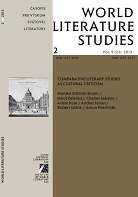Beyond ‘Global Babble’. Comparative Literature as a Critical Metatheory for Glocalizing Humanities
Beyond ‘Global Babble’. Comparative Literature as a Critical Metatheory for Glocalizing Humanities
Author(s): Adam Franciszek KolaSubject(s): Literary Texts
Published by: SAV - Slovenská akadémia vied - Ústav svetovej literatúry
Keywords: Glocalization; Comparative Literature; Comparative Studies; Intentional Rationality; Non-Western Knowledges; Critical (Meta)theory
Summary/Abstract: The article is based on three pillars – convictions regarding both the strictly academic world and the highlighted position of comparative literature in modern humanities and social studies, and from a wider perspective, rational coexistence in multicultural, globalized societies. The first pillar is connected with the postmodern presumption that the 21st century will be domain of globalized academic research and theories and truly cosmopolitan societies. I would not agree with this diagnosis. I argue that glocalization is a real perspective for this century. The second pillar is a conviction that comparative literature should expand beyond the academic realm to wider social life. The third pillar is located back in academic practice, and I argue that comparative studies could and should be a critical metatheory for all the humanities, for not only globalized but rather glocalized times. Glocalization of comparative discourse could be a good chance to, on the one hand, find our own voice in accordance with tradition, but – on the other hand – could allow us to find our own place in global humanities and social sciences. Thus, even if the social and political context is nowadays favourable to comparative studies, success is possible only in a new version of organic work – at schools, on the Internet, in public debates, etc. – on a planetary scale, beyond any centrism (Euro-, Sino- or other). Glocalization respects the local, but without its fetishization, and does so contemporaneously with consciousness of the other traditions and global scale of interactions. It is true not only in the financial world but also in the realms of cultures.
Journal: World Literature Studies
- Issue Year: V/2013
- Issue No: 2
- Page Range: 39-51
- Page Count: 13
- Language: English

